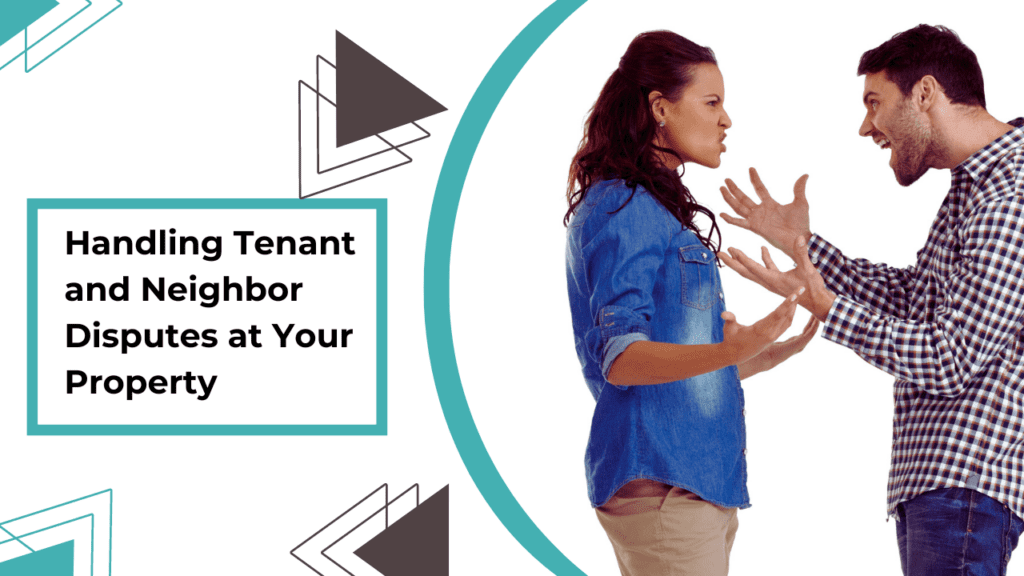
Are you the type of person who shies away from conflict and confrontation, or are you someone who enjoys a little bit of drama and chaos?
When you’re renting out a property and your tenant is having problems with a neighbor, the problem might become yours whether you want it to or not.
In some cases, there’s not much you can do. When your tenant is engaged in a dispute with a neighbor who is not also a tenant of yours, you cannot intervene beyond encouraging communication and resolution. When both tenants are renting properties of yours, you’ll need to rely on the lease agreement.
Handling tenant and neighbor disputes at your property is not one of the better parts of being a landlord. If you do find yourself with a conflict, here are some of the actions we recommend.
Disputes between Your Tenants
Perhaps you’re renting out a duplex or several condo units. Maybe you own a small apartment building or there are even two single-family homes that you own where tenants just don’t get along.
Is it your problem?
Not really, but you may be called upon to intervene if a dispute or conflict begins to escalate or has one tenant feeling like they might need to move. Your job as a landlord is to provide a safe and habitable home to all your tenants. You may lose a good renter when another renter is creating problems.
Here’s how to handle problems between your tenants that ultimately become your problem.
- Check Your Lease. And Share It.
When tenants are arguing over loud music in the middle of the night, television sounds that make the walls vibrate, pets leaving messes in common areas, and neighbors parking in reserved spaces, you’ll need to pull out your lease agreement and ask the tenants who are complaining to consult their lease agreement. Usually, things like quiet hours, parking, and guest policies are addressed in the lease. This is your best opportunity to keep all of your tenants following the same rules.
Have all of your residents signed the same lease?
Probably. Even if the leases are slightly different, the same rules and regulations are likely present in any lease your tenants signed. The document surely outlines the requirements and expectations of their tenancy, and you’ll want to share that section of the lease with both the complaining tenant and the accused tenant.
A consistent and well-enforced lease leads to a safe environment, where tenants do not have to worry about harassment or threats from their neighbors. You cannot be a landlord who tolerates bad behavior from one or more tenants.
The lease should stipulate the conditions of the property that create a comfortable and peaceful environment, where there is little noise or nuisance.
Create a lease that is specific about quiet hours. Most rental properties enforce quiet hours between 10:00 p.m. and 8:00 a.m. Your tenants are likely to be on all different schedules. Maybe one tenant works nights. That’s difficult to navigate because you cannot write your lease to meet the lifestyle needs of every tenant. But, setting up a consistent timeframe for less noise gives you a good starting point to avoid disputes.
Use and enforce your lease. This is your right and your responsibility as a landlord.
- Put Together a Dispute Resolution Policy
You want your tenants to resolve their problems with one another on their own. It’s best if you don’t have to be involved at all.
But, this is not a perfect world, and a tenant who is bothered will likely complain to you.
Often, a minor dispute or conflict is a simple matter of needing better communication between tenants. One tenant who is accused by another tenant of making too much noise may not even realize how thin the walls are and how easily their neighbors can hear their television or their music. It’s possible a simple conversation is all that’s required.
If a simple conversation doesn’t work, your residents will need instructions for how to file a complaint about neighboring tenants.
Have a policy in place for this. Ask for a written complaint so you have it documented. This gives you the opportunity to acknowledge the complaint and to show the tenants their comfort and security is important to you.
Hopefully, the issue between your two tenants is minor. But, if someone is feeling threatened or a tenant is creating a hostile and unsafe environment, involve the police immediately.
- Document Every Tenant Complaint
We like to remind our owners and the landlords who come to us for support that it’s important to document everything.
Every conversation, every complaint, and even every ultimate resolution needs to be in writing. You never know when you’ll need this.
If the complaint from one tenant reflects a lease violation from the other tenant, you will need to make contact with the tenant in question and ask them to come into compliance. Loud parties at 2:00 a.m. may violate the quiet clause in your lease, and a barking dog is a problem if the lease does not allow pets. Put the details and the timeline in writing so you can identify the lease violations that may be present. This will help if you have to evict.
If the police are called, obtain a copy of the police report.
Hopefully, it won’t get to the point that you need to evict a tenant who is causing problems for other tenants. Remember, however, that this is always an option.
Disputes between Neighbors
What happens when a tenant is having problems with a neighbor who is not your tenant?
It gets more complicated, because you can only enforce the lease agreement that your tenant has signed. The neighbor is under no obligation to observe your rules.
You still want to support your tenants, even if your own options are limited. Here’s what we recommend.
- Practice Active Listening
Your tenants might understand that there’s nothing you can do about a disruptive neighbor. Maybe they just want to be heard.
This is why it’s important to listen. Be a resource and remain empathetic.
Your tenant is living in your property, and you want them to enjoy their home. In the lease, they have a right to the quiet enjoyment of their home. If a neighbor is interfering with that, there will understandably be a complaint, and as the landlord, you’ll be expected to resolve it.
When your tenants come to you with a complaint about noise, pet problems, parking issues, or other problems and nuisances that they’re experiencing, they want to be heard. It’s your responsibility to let them make their complaint.
Accept the complaint your tenant is making, and check in with them a few days later to see if anything has been resolved or improved.
This is tough, and your tenants need you to be on their side. You may not know what it’s like to have a dog barking 24 hours a day, but you can agree that it’s disruptive and unfair. Ask questions when your tenant is sharing their concerns, and talk about what they’ve already done – or tried to do – to remedy the situation.
- Encourage Communication
Before you get involved, make sure there’s been an effort to resolve the issue in a peaceful way. Communication is always important in clearing problems and resolving conflicts, and if your tenants are comfortable talking to their neighbors, you’ll want to recommend that as a first step.
There is nothing wrong with recommending a neighborly discussion about whatever problems there are. Maybe the offending neighbor will be responsive and apologetic.
If your tenants are too nervous about talking to the neighbors or fear for their own safety, you can offer to talk with those neighbors yourself. This isn’t necessarily your job, and you should not feel obligated. However, you’re trying to provide good customer service to your tenants, and you don’t want to lose them.
- Work with the HOA if Applicable
There isn’t a lot you can do about a bad neighbor, but you can be responsive to your tenant. Check in to see if things are better, worse, or the same. Always document the complaint in great detail in case it needs to be escalated.
You might have some extra leverage if you’re renting out a property in an HOA or a condo association. When there’s a problem with the behavior of a neighbor, you can go to the association board to resolve the issue or ask them to intervene and talk to the neighbor who is causing problems. There are almost certainly rules about noise, quiet hours, parking, disruptive parties, and pet clean-up.
 It’s tough to be the referee when your tenants are fighting or a tenant and a neighbor cannot seem to get along. When you’re working to keep the conflict from escalating, make sure you’re supportive of your tenants and documenting everything. If you need some extra support around tenant relations, we’d be happy to help. Please contact us at Anchor Down Real Estate and Rentals.
It’s tough to be the referee when your tenants are fighting or a tenant and a neighbor cannot seem to get along. When you’re working to keep the conflict from escalating, make sure you’re supportive of your tenants and documenting everything. If you need some extra support around tenant relations, we’d be happy to help. Please contact us at Anchor Down Real Estate and Rentals.
